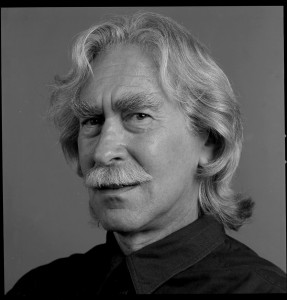So Bad It’s Good: An Interview with Wolf Larsen
My wife says that I “just have a bizarre fascination with him.”
“Him” being “Wolf Larsen,” and she’s right. Like my wife, my literary-minded colleagues—and, I’m guessing, most people—have been content to indulge my fascination for a moment then brush it off, saying, “That’s great, Jamie. Yes, it’s hilarious. The guy’s crazy.”
That’s what happened when I became aware of his existence through a submission to a literary magazine (we were all together for a meeting, sitting around a large table). I kept going back to that submission, laughing intermittently for over an hour as I marveled at this literary accident. How can you not find hilarity in books with titles like Pricks, Cunts, and Motherfuckers, or Ten Thousand Penises in Your Ear? Then there’s God and the Devil Dancing through World War III Together, with my favorite cover copy for a book ever: “The characters in this book include Caligula, Marie Antoinette, Wolf Larsen, yuppie cannibals, crack whores, Adolf Hitler, the Virgin Mary, the entire human race, etc.”
What I can’t figure out is if Wolf Larsen (obviously a pseudonym, taken from the Jack London character) just totally sucks, and that’s why I sometimes find myself going back to his homepage (like rubbernecking), because he knows it and he owns it, or if he’s oblivious, or if he doesn’t care and it doesn’t matter. I’m leaning toward a combination of all these, and tossing in a little plain old crazy to top it off. Still, there’s a paradoxical value to Wolf Larsen’s existence; or maybe that’s just my obsession.
Before this interview I tried contacting Wolf Larsen for over a year. I had forgotten about him till one night with a friend I remembered him and his website and said, “You’ve got to check this fucker out; it’s hilarious.” That friend suggested this interview, so I sent emails that garnered no response. I found some online venues and poetry forums where he’d published or posted and tried getting in contact through those editors’ and other’s emails or avatars: nothing. Then the other day I googled “Wolf Larsen,” and came across a blog (mentioned below). Wolf Larsen had surfaced. A blog comment later, we started up this dialogue.
i’m a bullhole cliche / assshit: An Interview with Victoria Trott

When I started reading online literature, sometime in mid-2008, I discovered a short list of bloggers/writers (Tao Lin, Ellen Kennedy, Zachary German) with similar attitudes and approaches to literature. Later, when Muumuu House was established, I found, among them, a new name: Victoria Trott. I read her poems, her blog, and it was all very strange, funny, and poignant. On Halloween 2009, I met her at a late night get together in (where else) Williamsburg. She seemed quiet, estranged, grinning aimlessly. By then she’d sort of disappeared from the online scene, leaving behind only a few publications (not to mention an unreleased forthcoming issue of German’s now-discontinued litmag), an altered moniker, and a lot of questions. In late 2009, she created a hilarious, ingenious Twitter account, and in summer 2010, a wonderful new blog. Finally there was some clarity, openness, continuity, but still, I was curious. Last fall, I compiled a list of questions I had for (and regarding) Victoria in a Gmail draft. Then I emailed her some of those questions, commencing a slow correspondence, spanning three months. Here are the results:
David Fishkind: Hi Victoria, How are you?
Victoria Trott: Hey David, someone bought me breakfast today and I took half of a Ritalin, I feel pretty good. How are you?
How did you get involved with online literature? Or maybe, what is your time line of involvement?
Here’s a timeline of my involvement with online literature, which has the stuff about blog switching, I think
2007 – high school sophomore, read Hikikomori on Bear Parade. showed Tao Lin’s blog to my friend, she said “amoeba ass?” and laughed with a puzzled face.
Where can we go now, motherfucker?: An Interview with A. Minetta Gould

A. Minetta Gould was raised in the mittens by a beautician. She’s since transplanted herself to the West where she worries herself with rust, the epic, and pagination. She’s the managing editor for Black Ocean and edits the journal Lonesome Fowl. She is the author of two recent chapbooks: Arousing Notoriety (Publishing Genius, 2011) and Dutch Baby Combo / The Boys are Talking about Restlessness at Five-Points (Spooky Girlfriend Press, 2011).
Nathan Logan: I first remember encountering your work in elimae, and then in the fifth issue of Caketrain. Your poems seemed strange in the best kind of way—in both issues, no other poets seemed to be up to what you were doing. It is a hard feeling/observation to quantify. Do you see yourself as writing in/out of some tradition—do you get your cues from any specific poets or schools of thought?
A Minetta Gould: I think the poems you saw in elimae and Caketrain work outside any poetic tradition for a very simple reason: I didn’t know anything about poetry, really. I started writing poems when I was 20 or 21, and I started publishing when I was 21 or 22, and I hadn’t yet realized how to examine the tradition. I was influenced by play, by being anything but the tradition, and had no desire inside myself to learn about it. The first books of poems I read were by kids—people who were maybe 25-30—from small presses. The first books I can remember buying are Jason Bredle’s A 12 Step Guide (whoever has that please give it back) and Laura Glenum’s Hounds of No (which also is no longer in my possession). I had no clue what was going on in those books, but I knew I liked it, and knew I wanted to be weird. I didn’t have time for dead white guys, the 1970s, or, heaven forbid, craft studies.
Then I turned 25 in my first year of grad school and realized it’d be super dumb of me to keep fooling myself into thinking weirdness came from ignorance. I started with the big buzz dude’s, the Surrealists, and have worked my way around the scope of what it is I think I may do. At this point in my career (I think I’m referring to an academic career here, not some sort of poetic one) there are several names/traditions that obviously have an influence on my writing: Lyn Hejinian, Mina Loy, Russell Edson, Charles Baudelaire, Paul Celan, etc. I’m intensely interested in the Lyric due to my intense studies with Martin Corless-Smith, and will probably never let those dirty little tricksters of the Surrealist Movement go.
Book Giveaway: Applies to Thorson
 Here’s a chance to win a copy of Maureen Thorson’s Applies to Oranges, which is one of the top five most beautiful books of 2011. No doy, it comes from Ugly Duckling Presse so that means it’s impeccably designed and intentionally detailed: good paper, letterpress cover, set in a typeface I hadn’t heard of (Bembo). But I don’t let that overshadow the poetry, which I first read and thought, “Damn, these are consistent.” They are the melt-in-your-mouth variety. You read one in a comfy chair after work and let it mellow. There’s an orange in every poem, and every poem is about 15 lines long and just one stanza. Earlier I thought the poems were quiet, but reading the book again now I realize no not quiet, tense. For instance, this sartorial sorrow:
Here’s a chance to win a copy of Maureen Thorson’s Applies to Oranges, which is one of the top five most beautiful books of 2011. No doy, it comes from Ugly Duckling Presse so that means it’s impeccably designed and intentionally detailed: good paper, letterpress cover, set in a typeface I hadn’t heard of (Bembo). But I don’t let that overshadow the poetry, which I first read and thought, “Damn, these are consistent.” They are the melt-in-your-mouth variety. You read one in a comfy chair after work and let it mellow. There’s an orange in every poem, and every poem is about 15 lines long and just one stanza. Earlier I thought the poems were quiet, but reading the book again now I realize no not quiet, tense. For instance, this sartorial sorrow:
If we had lived a hundred years, I’d say
give me washed leather, milliners’ pins,
Battenburg lace looped in orange silk.
Let me learn the politics of exclusion–
six hundred threads to the inch. In place
of island chic, a native’s pretend servility,
I’d dress to show that sorrow can harden
into a surface more starched than any collar,
more formal than the pleats of a skirt
as its hem dusts a dim corridor. It sets.
It makes creases I’ll never press out. READ MORE >
Drinking at the Movies
I glow Hobart and came across an interview with Julia Wertz. Interesting. I then went to her comic blog (once named Fart Party, but she’s tired of that phrase). I then $$ her book. I also glow drinking at the movies. Once, during an absolutely packed house of the showing of Fahrenheit 911 (this was Massachusetts, go figure), I snuck a Fosters oil can into my pants and then when I opened it (always an awkward moment) the beer loudly exploded all over my jeans. That was embarrassing. Julia Wertz is a graphic memoirist. Often she is stumbling, spilling things, misunderstanding the situation, young and dumb (I mean the type of dumb that comes with this developmental age; the character is always self aware and obviously intelligent) and wander/wondering about Brooklyn—often, well, embarrassed. (Example: At one point, she has a giant, painful, of-unknown-origin rash on her ass.) If you are about to go all Oh God another story about a twenty-something in Brooklyn, blah, blah, bar scene, go right ahead. In the introduction, Julia Wertz says, “As an autobiographical writer, I had no choice but to portray the natural progression of my life, and I apologize to anyone who’s sick of these stories as I am.”
It’s an insightful, funny thing to say, and most likely speaks to one of the more endearing aspects of this character, her voice.
By the time you get to the murder it’s going to seem like a cough: An Interview with Andrea Seigel
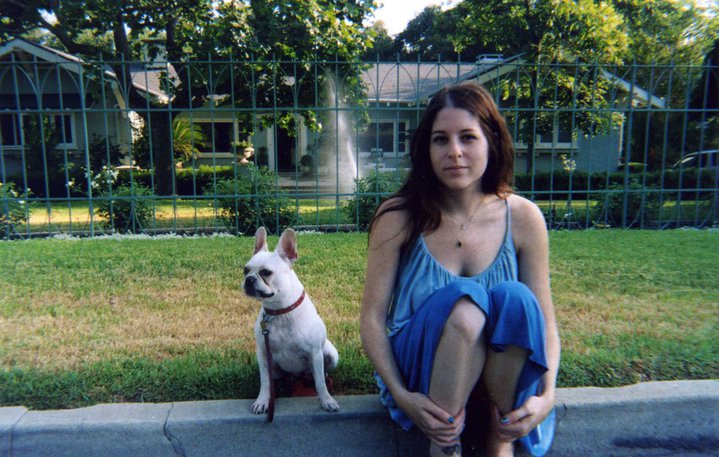
I met Andrea Seigel ~5 years ago while we were both at Bennington. Unlike most writers, she was more down to talk about soap operas and strange medical conditions and wicked dance moves than book junk, which those familiar with her work probably won’t find at all surprising. So far she’s published three books of young adult fiction, of a voice surprising I think to even that genre: often wry and dark and funny, though also carrying heavy material in a rather elegantly surreptitious way. Over the past several weeks we traded emails about her latest book, The Kid Table, as well as the influence of TV and screenwriting, narrative function, daily process, the influence of the internet, particularly twitter (of which, her feed is one of my constant favorites), and more.
BB: I remember when we were in school you said you would often write in front of the TV or with the TV on, and maybe that you couldn’t write without it that way? Is that right, and do you do that still? How does that work, or what does it allow you?
AS: i used to be like that and then i don’t know why, but i didn’t want to do it anymore. maybe it was getting high-speed internet– i didn’t used to have that, and now the combination activity is that i watch tv and fuck around on the internet. around 2008 i was still writing everything but novels with the tv on, like i wrote a screenplay and an sat audiobook that year. but i started writing my young adult book to complete quiet. you know, that could also have something to do with the fact that my boyfriend was basically living with me during that period, and then he was actually living with me, and we were in one room.
the reason i used to write with the tv on was because one, there weren’t enough hours of the day to get everything in that i wanted to get in, so i had to double up. and two, i used to feel that watching tv while i was writing helped me be less neurotic about writing because i’d be half thinking about a performance on “american idol” and half thinking about my book, and maybe this is a false memory, but i remember my first book getting written so easily and so fast that way, like i don’t remember ever being stuck.
Book and Beer: Pabst Blue Ribbon and Tongue Party
Whether corporeal or euphemism or just name for a Tuesday evening out with some new friends, Tongue Party is something you would want to attend. It is also a book by Sarah Rose Etter. It is the winner of the 2010 Caketrain Chapbook Competition. To glow this award is a good thing, and when Deb Olin Underth is the judge, I’d go ahead and say great thing. Also has anyone else noticed Caketrain’s chapbooks look and feel better than a lot of people’s book books? Just saying.
Pabst Blue Ribbon is a beer from Los Angeles. Los Angeles is a town where people will stab you in the back as you are climbing a ladder. PBR has a taste sort of like rain, rain gutter, corn and a hint of pale malted irony. Develops a bit of a yeast flavor as it warms. What is irony? I’m not totally sure but Kenneth Rexroth’s third wife left him for their marriage counselor. Bon Jovi plays the radio. A bird hunter pal of mine asked a bird watching pal of mine for advice on binoculars. In the last 5 years PBR has ironically doubled in price. Etc.
I was wondering if Sarah Rose Etter was being ironic in her opening of the first story, Koala Tide, as she seemed to mimic certain Hemingway devices, especially the use of the word “very.”
“The sun was very big and very hot that day.”
“The sky was very blue.”
“Fred wore blue swim trunks and had a very hairy chest.”
But then Etter took us away from this tone, spun us into something detached, this Koala Tide, tide of actual Koalas or again a euphemism or local jargon or objective correlative or perceptive lens of a child during that age, that Bildungsromanian blur, where childhood bleeds [emphasis on bleeds] into adulthood, where pain is introduced as possibility, where we learn not only are adults not Gods, they are slow, aging, stupid, stumbling sub-gods, mumbling who-knows-what into their lipsticked cans of warming beer? This story is evocative and disturbing and badass. You can read it here, and should.
6 Books: Deb Olin Unferth on Nonfiction
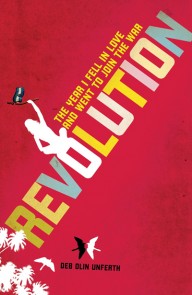 In this week’s installment of 6 Books, Deb Olin Unferth, author of the brilliant, laconic memoir Revolution, recommends 6 nonfiction books. Here are her picks:
In this week’s installment of 6 Books, Deb Olin Unferth, author of the brilliant, laconic memoir Revolution, recommends 6 nonfiction books. Here are her picks:
To After That (Toaf) by Renee Gladman
It’s a book dedicated to a book she has written: what is a cooler premise than that?
Parrots for Dummies by Nikki Moustaki
Yes, from the Dummies series, a simple how-to book: feeding, cleaning the cage, etc., but stay with me here. I found the book very moving. Her portrait of the parrot is of a tragic figure in a cage—it feels almost Kafkaesque. She captures the personality of the parrot as a beautiful, complex, panicky person who you’d do anything for in hopes that it’ll fall in love with you. And there’s also the sadness of the author, who you can tell is struggling: she has to write about clipping, though she mostly hates it. She has to talk about breeding though she thinks it’s a terrible idea. She includes pictures of birds flying in the Amazon—there, isn’t that beautiful? Isn’t that where they belong? They fly a hundred miles a day out there, while here they can move only a few feet. Which is better for them, do you think? she wonders.
Changing My Mind by Zadie Smith
This book has shown up on so many lists now that it’s almost like putting Consider the Lobster on this list. But I’m including it here because you know what? Zadie Smith is a badass.
The Autobiography of Alice B. Toklas, by Gertrude Stein
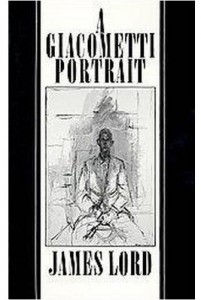 This may be my favorite book of all time. This is the book that made all my short shorts possible, that made my memoir, Revolution, possible. I first read it riding a train to Chicago and I’ve never been the same. How to write about war and make it funny. How to write about furniture and make it sad.
This may be my favorite book of all time. This is the book that made all my short shorts possible, that made my memoir, Revolution, possible. I first read it riding a train to Chicago and I’ve never been the same. How to write about war and make it funny. How to write about furniture and make it sad.
A Giacometti Portrait, by James Lord
For Lord—who agreed to sit for a portrait for Giacometti—what initially seemed like a pleasant afternoon turned into an existential nightmare, as Lord discovered just what “finishing” a portrait meant to Giacometti.
Atlas of Remote Islands, by Judith Schalansky
How can descriptions of islands far, far away—islands that I’ll never visit, islands that the author has never visited—feel so lonely?
An Interview with Dan Chodorkoff
Meet Dan Chodorkoff.
He’s not the typical writer we would promote here. He’s got a head full of silverfox hair and an unironically killer moustache, and his writing is unabashedly political. His first novel, Loisaida, is a Bildungsroman, following the development of a young anarchist, Cathy, as she fights “the man” from her squat. A viciously honest rendition of the naïve privilege of many young anarchists, Cathy learns the nuances of activism and politics. Part history lesson, part political guidebook, Loisaida is a book for anyone who’s carried a protest sign, shouted chants, felt the camaraderie of mass demonstrations, and had it all matter for shit.
So, meet Dan. Meet his book. Meet his politics.
LH: Your novel appears to demonstrate an ambivalent relationship towards anarchism. What does anarchism mean to you? Do you consider yourself an anarchist? In what ways does your relationship to anarchism color your portrayal of anarchists?
DC: Anarchism is the most misunderstood and maligned philosophy in existence, and, that misunderstanding may be a bi-product of anarchism itself. Noam Chomsky, in his forward to Daniel Guerin’s fine book “Anarchism: from Theory to Practice”, quotes an unnamed 19th century French writer: “Anarchism has a broad back, like paper it endures anything” including those who’s acts are such that “a mortal enemy of anarchism could not have done better.” The rubric of anarchism encompasses a wide range of thoughts and actions some that I find silly and useless, a few that I deplore, and others that I find extremely admirable. READ MORE >

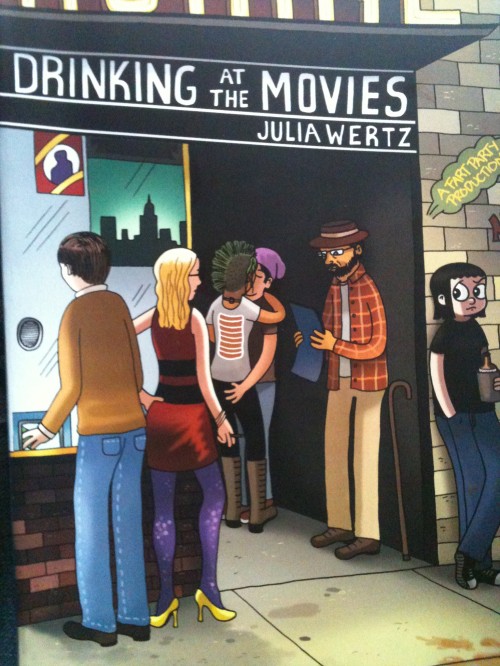
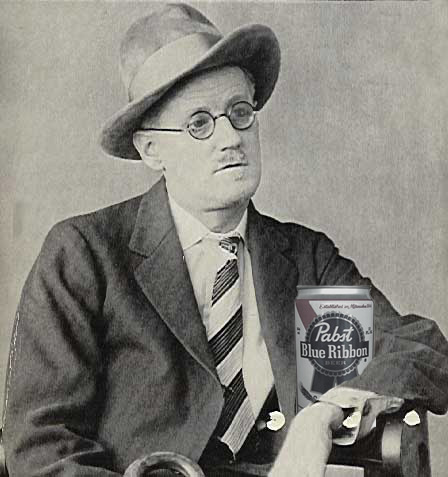
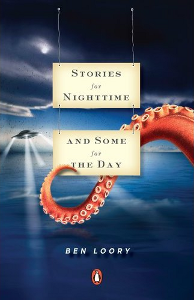 Ben Loory’s first book,
Ben Loory’s first book, 